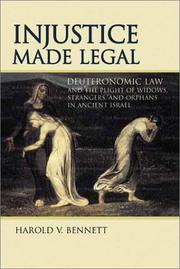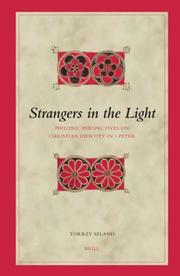| Listing 1 - 10 of 14 | << page >> |
Sort by
|
Book
ISBN: 9780814645048 9780814645291 Year: 2017 Publisher: Collegeville, Minnesota Liturgical Press
Abstract | Keywords | Export | Availability | Bookmark
 Loading...
Loading...Choose an application
- Reference Manager
- EndNote
- RefWorks (Direct export to RefWorks)
Strangers --- Strangers in the Bible --- Religious aspects --- Christianity
Book
ISBN: 0788501259 Year: 1995 Publisher: Atlanta Scholars Press
Abstract | Keywords | Export | Availability | Bookmark
 Loading...
Loading...Choose an application
- Reference Manager
- EndNote
- RefWorks (Direct export to RefWorks)
Alienation (Theology) --- Strangers in the Bible --- Strangers --- Case studies --- Religious aspects --- Christianity --- History of doctrines
Book
ISBN: 9781138704619 113870461X 9781315202600 Year: 2017 Publisher: London Routledge
Abstract | Keywords | Export | Availability | Bookmark
 Loading...
Loading...Choose an application
- Reference Manager
- EndNote
- RefWorks (Direct export to RefWorks)
Strangers in the Bible --- Neighbors --- Judaism --- Jews --- Judaism --- History --- History --- Relations --- Bible. --- Bible. --- History of Biblical events. --- Criticism, interpretation, etc.

ISBN: 0802839096 Year: 2002 Publisher: Grand Rapids (Mich.): Eerdmans
Abstract | Keywords | Export | Availability | Bookmark
 Loading...
Loading...Choose an application
- Reference Manager
- EndNote
- RefWorks (Direct export to RefWorks)
Critical legal studies --- Orphans in the Bible --- Social justice --- Social legislation (Jewish law) --- Strangers in the Bible --- Widows in the Bible --- Biblical teaching --- Bible. --- Social scientific criticism.
Book
ISBN: 1299317022 1589836626 Year: 2012 Publisher: Atlanta : Society of Biblical Literature,
Abstract | Keywords | Export | Availability | Bookmark
 Loading...
Loading...Choose an application
- Reference Manager
- EndNote
- RefWorks (Direct export to RefWorks)
Strangers in the Bible. --- Imagery (Psychology) in children. --- Imagination --- Religious aspects. --- Bible --- Bible --- Bible --- Criticism, Narrative. --- Language, style. --- Criticism, interpretation, etc.
Book
ISBN: 9783447064705 3447064706 Year: 2011 Publisher: Wiesbaden : Harrassowitz Verlag,
Abstract | Keywords | Export | Availability | Bookmark
 Loading...
Loading...Choose an application
- Reference Manager
- EndNote
- RefWorks (Direct export to RefWorks)
Strangers in the Bible --- Aliens (Jewish law) --- 221.08*2 --- 221.08*2 Theologie van het Oude Testament: moraal; ethica; juridica Israelis; vroomheid --- Theologie van het Oude Testament: moraal; ethica; juridica Israelis; vroomheid --- Jewish law --- Conferences - Meetings --- Noncitizens (Jewish law)
Book

ISBN: 9781531507343 1531507344 Year: 2024 Publisher: New York : Fordham University Press,
Abstract | Keywords | Export | Availability | Bookmark
 Loading...
Loading...Choose an application
- Reference Manager
- EndNote
- RefWorks (Direct export to RefWorks)
Embracing hospitality and inclusion in Abrahamic traditionsOne of the signal moments in the narrative of the biblical Abraham is his insistent and enthusiastic reception of three strangers, a starting point of inspiration for all three Abrahamic traditions as they evolve and develop the details of their respective teachings. On the one hand, welcoming the stranger by remembering “that you were strangers in the land of Egypt” is enjoined upon the ancient Israelites, and on the other, oppressing the stranger is condemned by their prophets throughout the Hebrew Bible.These sentiments are repeated in the New Testament and the Qur’an and elaborated in the interpretive literatures of Judaism, Christianity, and Islam. Such notions resonate obliquely within the history of India and its Dharmic traditions. On the other hand, they have been seriously challenged throughout history. In the 1830s, America’s “Nativists” sought to emphatically reduce immigration to these shores. A century later, the Holocaust began by the decision of the Nazi German government to turn specific groups of German citizens into strangers. Deliberate marginalization leading to genocide flourished in the next half century from Bosnia and Cambodia to Rwanda. In the aftermath of September 11, 2001, the United States renewed a decisive twist toward closing the door on those seeking refuge, ushering in an era where marginalized religious and ethnic groups around the globe are deemed unwelcome and unwanted.The essays in Welcoming the Stranger explore these issues from historical, theoretical, theological, and practical perspectives, offering an enlightening and compelling discussion of what the Abrahamic traditions teach us regarding welcoming people we don’t know.Welcoming the Stranger: Abrahamic Hospitality and Its Contemporary Implications is available from the publisher on an open-access basis.Published by The Fritz Ascher Society for Persecuted, Ostracized and Banned Art and the Fordham University Institute on Religion, Law and Lawyer’s Work
Other (Philosophy) in the Bible. --- Other (Philosophy) --- Strangers in the Bible. --- Strangers --- RELIGION / Ethics. --- Religious aspects --- Christianity. --- Islam. --- Judaism. --- Abraham. --- art. --- hospitality. --- immigrants. --- law. --- refugees. --- repairing the world. --- theology and politics.

ISSN: 09342575 ISBN: 3110166259 1306272823 3110802228 3111752003 9783110802221 9783110166255 Year: 2012 Volume: 283 Publisher: Berlin Boston
Abstract | Keywords | Export | Availability | Bookmark
 Loading...
Loading...Choose an application
- Reference Manager
- EndNote
- RefWorks (Direct export to RefWorks)
Etrangers dans la Bible --- Strangers in the Bible --- Vreemdelingen in de Bijbel --- 221.02*1 --- Oud Testament: bijbelse filologie: hebreeuws --- 221.02*1 Oud Testament: bijbelse filologie: hebreeuws --- Bible. --- Antico Testamento --- Hebrew Bible --- Hebrew Scriptures --- Kitve-ḳodesh --- Miḳra --- Old Testament --- Palaia Diathēkē --- Pentateuch, Prophets, and Hagiographa --- Sean-Tiomna --- Stary Testament --- Tanakh --- Tawrāt --- Torah, Neviʼim, Ketuvim --- Torah, Neviʼim u-Khetuvim --- Velho Testamento --- Criticism, interpretation, etc. --- Bible. Old Testament --- Criticism, interpretation, etc --- Strangers in the Bible.
Book
ISBN: 9781589836617 9781589836624 1589836618 1589836626 9781299317024 1299317022 Year: 2012 Volume: 56 Publisher: Atlanta Society of Biblical Literature
Abstract | Keywords | Export | Availability | Bookmark
 Loading...
Loading...Choose an application
- Reference Manager
- EndNote
- RefWorks (Direct export to RefWorks)
Strangers in the Bible. --- Imagery (Psychology) in children. --- Imagination --- Religious aspects. --- Bible --- Criticism, Narrative. --- Language, style. --- Criticism, interpretation, etc. --- 268.712 --- -Imagery, Mental --- Images, Mental --- Mental imagery --- Mental images --- Educational psychology --- Intellect --- Psychology --- Reproduction (Psychology) --- Child psychology --- Cognition in children --- Kinderbijbels --- -Kinderbijbels --- 268.712 Kinderbijbels --- Didactics of religion --- -268.712 Kinderbijbels --- Imagery, Mental --- Imagery (Psychology) in children --- Strangers in the Bible --- Religious aspects --- Biblia --- Imagination - Religious aspects.

ISBN: 9004144919 9786610868438 1429453567 9047407938 1280868430 1433704293 9781429453561 9789004144910 9781433704291 Year: 2005 Volume: 76 Publisher: Leiden Brill
Abstract | Keywords | Export | Availability | Bookmark
 Loading...
Loading...Choose an application
- Reference Manager
- EndNote
- RefWorks (Direct export to RefWorks)
The author of the present work wants to throw new light on the intended readers of 1 Peter by investigating what it could possibly mean that they were to live as Strangers in the Light. It is argued that the author of 1 Peter considers his readers as living a life influenced by social circumstances very much comparable to those of the Diaspora proselytes to Judaism. Hence similar discussions in Jewish Diaspora works can illuminate his descriptions and exhortations. Among these Diaspora works, the works of Philo of Alexandria should be drawn into the discussions in a much more comprehensive way than has been done so far. In addition to a study of the role of Silvanus in the making of the letter, this volume contains four studies that carry out what the author calls 'philonic readings' of central issues of 1 Peter 2,5-11. The study will demonstrate the usefulness of Jewish diaspora works for understanding the social life of the early Christians.
Etrangers dans la Bible --- Strangers in the Bible --- Vreemdelingen in de Bijbel --- 227*22 --- 227*22 Brieven van Petrus --- Brieven van Petrus --- Strangers in the Bible. --- Philo, --- Bible. --- Social scientific criticism. --- Alexandria, --- Filon --- Filón, --- Filon, --- Filone, --- Philon, --- Philonis, --- Yedidyah, --- פילון --- פילון מאלכסנדריה --- פילון, --- פילון היהודי --- Филон Александрийский --- Filon Aleksandriĭskiĭ --- Pseudo-Philo --- Epistle of Peter, 1st --- Peter, 1st (Book of the New Testament) --- Peter (Book 1) --- Bible. N.T. Peter I --- Social scientific criticism --- Philo of Alexandria --- Social scientific criticism of sacred works.
| Listing 1 - 10 of 14 | << page >> |
Sort by
|

 Search
Search Feedback
Feedback About UniCat
About UniCat  Help
Help News
News